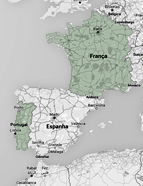

At the time of the SPHC's creation, research in Portugal was undergoing a very different experience to that in France. The year 1947 marked one of the greatest political purges of Portuguese universities during the Estado Novo [New State] (27 professors and university assistants), mainly affecting the areas of mathematics, economics, physics and engineering (Rosas and Sizifredo, Depuração política... [Political purge...] 2011). It was a period of enormous political unrest, fuelled by the opposition's hope that with the end of World War II the Estado Novo could be overthrown.
Magalhães Godinho, who was in Paris at the time, had delegated the mission of promoting the SPHC to nine researchers: Jorge Borges de Macedo, Joel Serrão, Joaquim Barradas de Carvalho, Rui Grácio (who had replaced José de Assis Mafra), Fernandes Martins, Fernando Pinto Loureiro, Armando Castro, António José Saraiva and Óscar Lopes. One of the common features characterising this group was that they all, to varying degrees, were involved in political and/or cultural opposition movements - six of these founding members were or would become communist activists (José Neves, Comunismo e nacionalismo... [Communism and nationalism], 2010, p. 311). Opposition to the Estado Novo was an important criterion, albeit not exclusive, in the composition of the SPHC. In the suggestions for new members, essential to the SPHC's financial feasibility, it is possible to partially reconstruct many of the personal, cultural and political relationships of these founding members and also to identify many of the intellectuals who were critical of the regime.
Magalhães Godinho immediately suggested the historians Jaime Cortesão and Veiga Simões - the former exiled in Brazil and the latter living in Paris, having being dismissed from his diplomatic post in 1946 - while other names were also advanced by the founding members: Fernando Piteira Santos, Armando Bacelar, Rui Feijó, Flausino Torres, among others who were well-known opponents of the Estado Novo and frequent contributors to some of the main cultural journals - O Diabo, discontinued in 1940, Seara Nova and Vértice. This network of contacts had been woven or strengthened around the Second World War, marked in Portugal not only by the emergence of the PCP but also by the formation of opposition movements such as the Anti- Fascist National Unity Movement (MUNAF), the Democratic Unity Movement (MUD) and the Youth Democratic Unity Movement (MUD Juvenil). The creation of the SPHC benefitted from these 'opposition politics' (José Neves, Comunismo e nacionalismo..., p. 312), difficult to replicate in the following decades that were not infrequently marked by personal and theoretical divergences, emigration, exile and the political demobilisation of many SPHC researchers.
